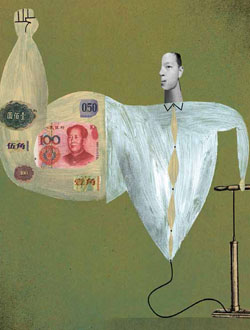“China’s main strengths are…

Richard Rosecrance
… first, an innate confidence that enables decision-makers and the industrial population to plan for the long term – even 20 or more years ahead. Second, in economic terms, the Chinese possess the ‘flexibility’ to modify their existing strategies to keep up with those of the West and Japan. As Alexander Gerschenkron, the great economic historian, pointed out years ago, latecomers to industrialization may possess the “advantages of backwardness” in that they have ready-made models of success to emulate. Second and third industrial powers like Germany and Japan could imitate Britain and France, and they could buy new technology off the shelf in textiles, machinery and electric power stations. This advantage, of course, has a correlative disadvantage in that it does not provide for Chinese strength in new or developing technology. As we know from past economic history, some latecomers like Japan and Germany worked extremely hard to keep abreast of modern developments in technology. Others like Stalin’s Russia fell behind and relied almost entirely on their cornucopia of oil and natural gas, often neglecting technical developments in consumer industry.
In value-added terms, Beijing’s contribution to industrial production remains less than one half of the proceeds from sales in Western and Japanese markets. Until recently, Chinese state-owned enterprises tried either to buy or steal industrial secrets and technology from Western firms. They have not had uniform success. As such, one question for the future is whether China will be able to follow the German road to success, or whether it will be slotted into the Russian dead end. Evidence suggests that Chinese firms will have to keep ties to Western markets and firms in order to remain abreast of the latest technologies.”
» Richard Rosecrance is Adjunct Professor, Senior Fellow, and Director of the US-China Relations Program at the Belfer Center of Harvard’s Kennedy School of Government. He is the author of The Resurgence of the West: How a Transatlantic Union Can Prevent War and Restore the United States and Europe (Yale University Press, 2013).
Hsiao-ting Lin
…its rapid economic growth and its colossal market. Chinese leaders have transformed a poor society by economic miracle to become the second largest economy in the world. China is the world’s fastest developing country today, growing at rates unimaginable half a century ago. This is a dramatic transformation that no one predicted. To ensure that its economic success is sustained, the Chinese government is focussed on educating its young people, selecting the brightest for the fields of science and technology, followed by economics, business management and the English language – all in order to retain the country’s global competitiveness.
Geopolitically, China’s economic prowess places it in a very strong position to suck its neighbours – most notably in Southeast Asia – into its economic orbit as a result of its vast market and growing purchasing power. Consider that China can impose powerful economic sanctions simply by denying access to its huge market of 1.3 billion people.”
» Hsiao-ting Lin is a Research Fellow and Curator of the East Asian Collection at the Hoover Institution, Stanford University.
Barthélémy Courmont
… d’abord d’ordre comptable: une puissance économique en plein essor, dont la croissance demeure relativement forte, malgré une légère baisse récente; une capacité d’exportation incontournable et que l’implantation de liens commerciaux avec les pays du Sud ne fait que renforcer; une population importante, qui malgré son vieillissement fournit une main-d’œuvre à bon marché, en particulier en provenance des provinces les plus reculées; ou encore une puissance financière exceptionnelle, avec des réserves de devises permettant à Pékin d’investir massivement dans le reste du monde.
La force de la Chine se mesure aussi, au niveau économique, par les réseaux qu’elle est parvenue à mettre en place avec les pays en développement, instaurant de nouvelles règles d’échanges et d’investissements, que certains observateurs n’hésitent pas à qualifier de consensus de Pékin, en opposition au consensus de Washington. Le caractère incontournable de la puissance économique chinoise, qui s’étend également aux pays développés, crée un nouveau paradigme dans lequel il est de plus en plus difficile, voire impossible, de dire non à la Chine. Enfin, Pékin bénéficie d’une image globalement positive dans de nombreuses régions, où les pays occidentaux sont vus avec méfiance, en raison notamment de leurs lourds antécédents.
Puissance diplomatique de premier plan, membre permanent du Conseil de sécurité de l’ONU et disposant de la principale force armée en Asie, la Chine reste en retrait des principaux défis stratégiques internationaux, s’implique assez peu et maintient ainsi une relation étroite avec des pays isolés, comme la Corée du Nord, l’Iran ou la Syrie. Si on peut y voir une faiblesse de la diplomatie chinoise, cette situation lui permet de maintenir des relations économiques et commerciales là où les autres grandes puissances sont absentes».
» Barthélémy Courmont est professeur de science politique à l’Université Hallym (Chuncheon, Corée du Sud) et chercheur-associé à l’Institut de relations internationales et stratégiques, ainsi que rédacteur en chef de la revue Monde chinois, nouvelle Asie.











